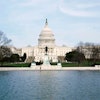The five-year, $305 billion highway bill announced by lawmakers on Tuesday includes approximately $70 billion in revenue from areas other than the federal gas tax that is traditionally used to pay for transportation projects.
The 1,300 page measure, which was unveiled days before a Friday deadline for renewing transportation funding, relies largely on revenue from reducing interest rates paid by the Federal Reserve to member banks, selling oil from the Strategic Petroleum Reserve that is used to prevent energy crises and increasing fees for customs processing.
The funding will be used to offset a transfer of about $70 billion into the Department of Transportation's Highway Trust Fund to close a trust-fund shortfall that is estimated to be approximately $16 billion per year until 2020.
The compromise unveiled Tuesday calls for taking $53.3 billion from the surplus of the Federal Reserve bank and $6.9 billion reducing the dividends that are paid to banks who are members of the Fed. Other funding sources in the measure include $6.2 billion from the sales of strategic oil reserves, $5.188 billion from customs fees, and $2.4 billion from a move to require the IRS to use private tax collection companies.
The main source of transportation funding for decades has been revenue collected by the 18.4-cents-per-gallon federal gas tax. The tax has not been increased since 1993, however, and more fuel-efficient cars have sapped its buying power.
The federal government typically spends about $50 billion per year on transportation projects, but the gas tax only brings in approximately $34 billion annually.
Transportation advocates have pushed for a gas tax increase to pay for a long-term transportation bill, but Republican leaders have ruled out a tax hike.
Congressional budget scorekeepers have estimated it would have taken about $100 billion, in addition to the gas tax revenue, to fully pay for a six-year transportation bill, which was the length that was originally sought by transportation advocates.















